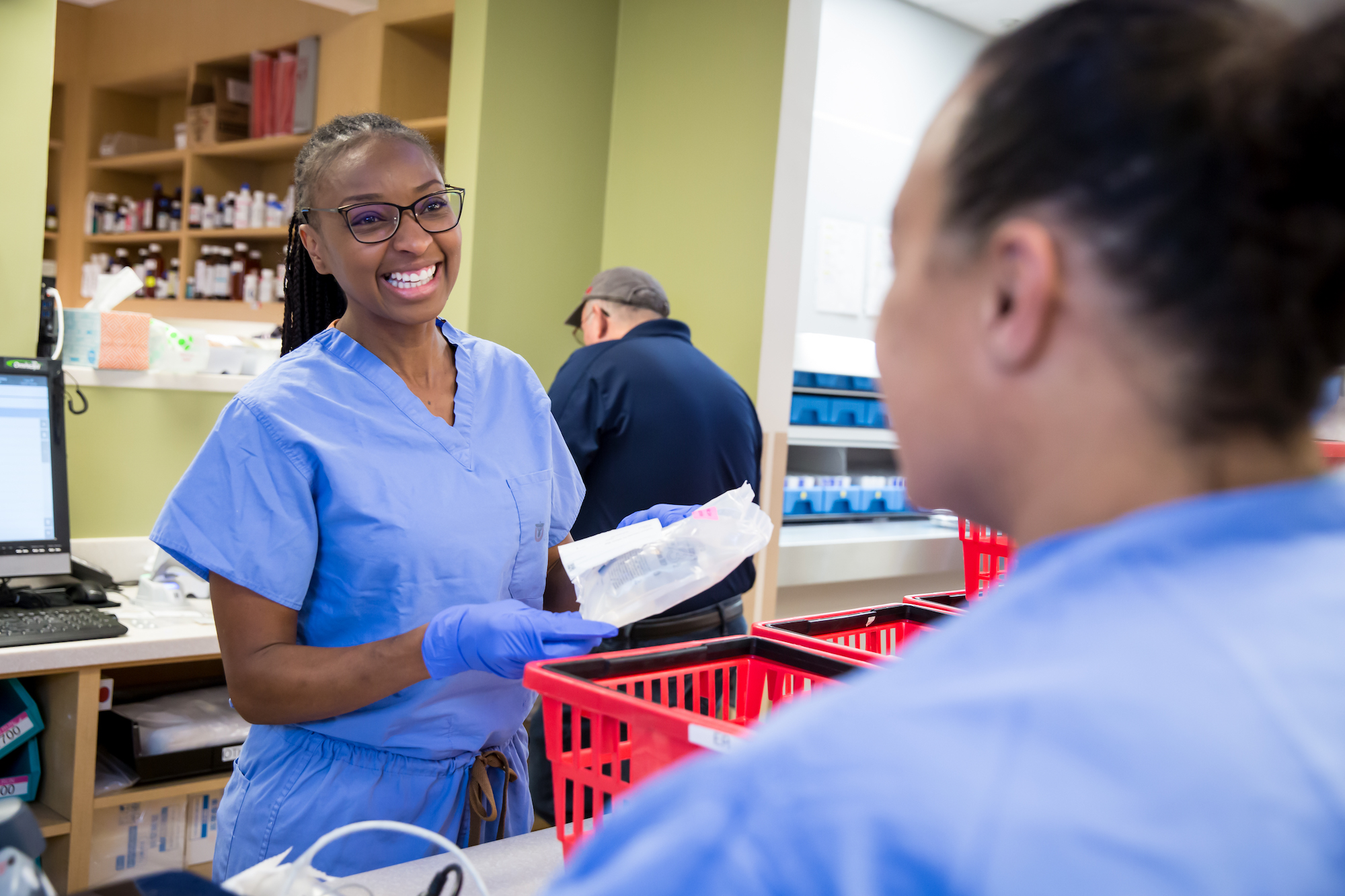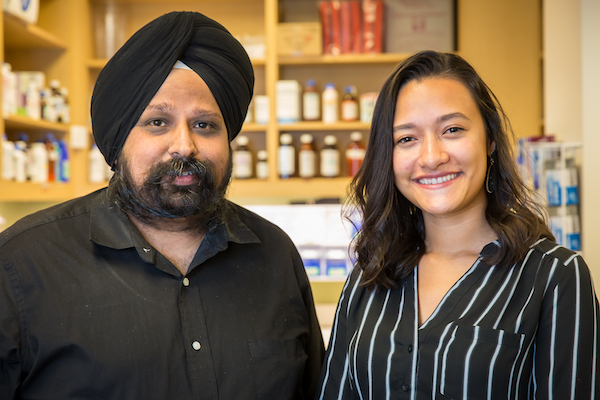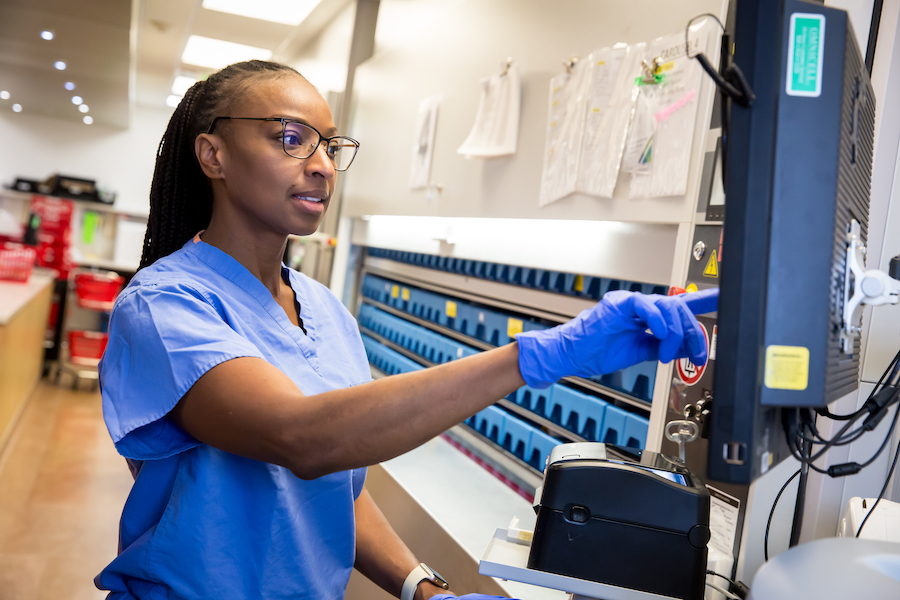

Heart and Soul
A free online pharmacy course offers both challenges and fulfilment for university employees struggling to make a better lifeA free online pharmacy course offers both challenges and fulfilment for university employees struggling to make a better life
Author: Stephen Dark
When Josie Thompson moved from Brazil to Salt Lake City, her dream was to be a pharmacist. She’d grown up in Embu das Artes—which means city of arts—in the Metropolitan region of Sao Paulo state, a town renowned for its arts and crafts history. Her first “real job,” she says, was in a pharmacy on an upmarket street in the Alto de Pinheiros district. For five years she worked at Endofarma—Farmácia de Manipulação, making patients’ medications. “The way that medication works on each person’s body is fascinating to me,” Josie says.
But in Utah, she learned that dreams weren’t something you were supposed to say you had. “Everybody has a dream,” she says she was told. “You need to say you have a goal.”
Josie married a man she met in her LDS Church ward and they had two children. Her husband has a rare cancer called myeloma, and an early surgery involved doctors removing four inches of his vertebra and replacing it with a large plate and screws that left him in near-constant pain.
Josie worked full-time, first as a store clerk, then a machine operator, trying to save money so she could afford pharmacy school. It was hard to get into the University of Utah’s College of Pharmacy program, which required a high GPA and many hours of community service.
Then Josie found work at the Huntsman Cancer Institute, hoping that would get her the experience she needed to become a pharmacist. She cleaned floors for six months, then worked in materials management, overseeing the stocking of products and equipment. There she heard about a new initiative organized by Raghbir Makhar, U of U Health pharmacy technician manager, offering an online technician certification course for entry-level employees such as medical assistants and cafeteria workers. They often have families or other responsibilities, Raghbir says, and can’t afford to attend school or struggle to make it to the end of the month. The course is free for full-time U of U Health employees; for part-timers, it’s 50 percent off. Students study at home at their own pace, although the U hopes they’ll finish within a year—if not, they can file for an extension.
“That’s what I need,” Josie thought. “Once I get into this program, this is going to help me become a pharmacist.”
Fighting for a future
University of Utah Health joined the Healthcare Anchor Network in Spring 2019. The Network’s 45 health system members “leverage resources as anchor institutions in their states to better their communities and their economies,” says RyLee Curtis, U of U Health’s community engagement director. Highlighting its commitment to the Healthcare Anchor Network, U of U Health will co-host the Network’s biannual conference focusing on community stakeholders and leveraging philanthropy on November 20-22, 2019 in Salt Lake City.
U of U Health has found that, by giving back to its employees, philanthropy can also benefit the institution. Workforce development strategies connect frontline workers to pathways for career advancement that address staff shortages within the institution. The pharmacy tech study program is just one example of U of U Health marrying the needs of its employees with its institutional needs.
The quest by U of U Health to boost its pharmacy tech numbers traces back to 2014. The health system, like many others in the United States, sought to free up pharmacists’ time by expanding the role of technicians to take on work traditionally done by pharmacists, such as checking all medication leaving the pharmacy. But while expanding the technicians’ role was easy on paper, Chief Pharmacy Officer Linda Tyler and Raghbir Makhar discovered that finding applicants to fill the new positions was another matter.
One answer they came up with: address the technician shortage by starting an online technician certification course. In Spring 2017, 21 signed up, half of whom were minorities. What united them was their search for opportunities to improve, Raghbir says. “They work to support their family. They can’t leave their job to go to school. They are barely managing to make things even, and they want to do something with their lives.”

Among the course’s success stories is 23-year-old Vivian Nguyen, who was born and raised in Salt Lake City in a Vietnamese-speaking family and learned English at school.
In spring 2017, Vivian was a college sophomore studying public health and an employee in U of U Health’s nutrition department. She felt she had stalled in her career, and when she learned about the online pharmacy technician course, she jumped at the chance.
The U paid 50 percent of the tuition and financial aid covered the rest. The only thing she had to give up was sleep, Vivian says, while learning how to better manage her time and not procrastinate.
In July 2018, after successfully completing the course, she became a U of U Health pharmacy technician. “You get to learn a lot every day,” she says. “It’s very fast-paced. You’re always moving, delivering medication.”
That summer, Raghbir invited the graduates to talk to potential new students at a pizza party. As he listened to the course graduates extol the program and its impact on their lives, he reflected not only on the benefits reaped by his department but how proud he felt of what the program had accomplished. Not only are the new graduates hired as pharmacy technicians improving their lives, he says, but “they feel like the university gave them the opportunity to grow.”
Twenty Precious Seconds
For Josie Thompson, who started the online course in Summer 2018, that growth has also extended to her children. She describes them as “little giants” who, having witnessed their father’s medical struggles, both want to be doctors. Her son, who’s won many awards at school, has wanted “to become the best surgeon in the country since he was six years old,” she says. “My daughter wants to become a doctor. They’ve been watching what I am going through and seeing me fighting to get where they want to get.” Her children want to help her all they can. “‘Mommy, you don’t need to cook,’” one of them will tell her. “‘We’re going to eat toast.’”
Josie talks with mounting excitement about everything the course exposes her to: surgery, neurology, and other medical disciplines. “You know up front you’re going to feel like it’s too much, that it’s overwhelming,” she admits. What drives her is a love for the profession. She pinpoints the 20 seconds she says she has when she enters a patient’s room to establish a relationship. “That 20 seconds, once you get it, the patient’s going to open his life to you,” she says. “He’s trusting you. I love that. I think that’s beautiful. They trust you so much to bring the solution to them right there.”

But with all her responsibilities, Josie struggled to finish the course within the required year. With two children to raise, a husband sick with cancer, and a full-time job at the U, in July Josie said, “I don’t have the arms that I feel like I need. I feel like I have three arms all being pulled at once. Sometimes I wish there were three of me. Two would be great. I still try to do my best.”
And then she learned her 76-year-old mother would not submit to heart bypass surgery unless Josie, her only daughter, was by her side in Brazil. “I’m a daughter, a mother,” Josie says. “I feel like I need to do my part. I want to do my part.” That meant having to request an extension for her studies while she spent almost a month in South America.
Josie left for Brazil on August 19. She spent every minute she could with her mother. “She’s my best friend,” she says, wiping away tears. She knew she was the only one who could give her the love and confidence her mother needed to have the operation and recover. “I try to prove to her that I need her around.”
The Limitless Sky
In mid-September, Josie returned from Brazil. Despite all the pressures at work and at home, she didn’t regret leaving for a month. She describes knowing she’s done something good—something that only she could do as her mother’s daughter—as so powerful. “I was so glad I was able to do that,” she says. “No one else can take it from me. It’s one of my treasured feelings. I did that for her. I was there.”
Nevertheless, as fall rolls on, Josie’s under increasing pressure, both in terms of the needs of her family and of the pharmacy department, which wants her to finish the course and get her license by the end of the year.
“I need to have my license,” she says. “I need to have it to get paid and get the benefits.” While her husband is an outpatient at the Huntsman Cancer Institute (and, thankfully, in remission) she needs the benefits both for him and her two children. “I feel like I don’t have any other priority right now beside this,” she says. “I need to get it done.”
She’s passed the halfway stage of the program but now has to do 200 unpaid hours as an extern, where she’s essentially an observer. “Raghbir’s planning to send me to departments where I haven’t been before,” she says.
Both surprised and proud of herself at what she’s already accomplished, her internship still requires sacrifices. “You need to give up the time with your family, give up your likes,” she says. Some of the course’s students don’t make the finishing line. “I couldn’t do it,” one woman told Josie. “I just don’t have the time.”

Josie can’t help but doubt herself. “Boss, I’m trying my best,” she told Raghbir. “But I don’t know if I can get it done.”
Raghbir speaks highly of his intern, describing her as hard-working, positive, punctual, and “very easy to get along with.” He sends employees to her to train. She tries to teach them to see the patient behind all the endless motion of technicians in the pharmacy around them.
“You give your best because the patient is behind this medication,” she says. “I love that. I want to be able to accomplish that, to make that patient better because of my service. One day I’m going to be the patient, and that’s what I expect.”
While Josie wishes time was on her side rather than bearing down night after night, she is committed to completing her studies and passing the licensing exam before the deadline imposed by the pharmacy department. “I have to and I will,” she says. “I have so many goals that I want to gain through this. Once I have the license done, even the sky is not going to stop me.”
Photos by Jen Pilgreen